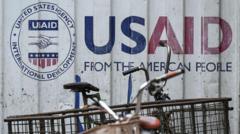Thousands of employees at the United States Agency for International Development (USAID) are set to be placed on leave starting Friday evening, according to an official announcement from the agency's website. The statement indicated that all "direct-hire personnel" would be affected, apart from those occupying "mission-critical functions, core leadership, and specially designated programs".
This decision marks the latest action in a series of budget reductions initiated by President Donald Trump upon his recent return to office. Observers express concern that this move could have a detrimental impact on humanitarian initiatives globally.
In its announcement, USAID pledged to coordinate with the State Department for the travel arrangements of staff stationed abroad, ensuring that these employees can return within the month. Those who remain on duty due to exemptions will receive notification by 15:00 EDT (20:00 GMT) on Thursday.
The agency is responsible for delivering humanitarian aid across more than 100 countries and employs approximately 10,000 people, with about two-thirds based overseas, as per the Congressional Research Service. This announcement follows an email sent to multiple USAID staffers earlier this week, advising them of their placement on paid administrative leave. Employees were instructed to remain "available" via phone and email but were not permitted to enter USAID facilities.
Since taking up residence in the White House last month, Trump and his associates have been aggressive in their approach to reducing government expenditures, with recent targeting of USAID. Secretary of State Marco Rubio has become the acting head of the agency, effectively merging it into another governmental body. Elon Musk, appointed to oversee a new agency designed to cut U.S. government spending, has been vocal in his opinion that USAID is "beyond repair" and should be abolished.
Critics argue that such drastic measures would endanger aid for vulnerable populations worldwide. USAID’s work includes vital services from assisting injured soldiers in Ukraine to combating diseases like Ebola in Africa. Democrats, particularly, have denounced the administration's actions regarding USAID. New Jersey Senator Andy Kim emphasized on social media that shuttering the agency would hinder U.S. efforts to maintain its position in a challenging global landscape.
Founded in 1961, USAID operates in 60 countries and manages significant financial resources, having overseen more than $40 billion (£32.25 billion) in the fiscal year 2023, according to the Congressional Research Service. The ongoing changes reflect a broader narrative of tension regarding U.S. foreign aid and domestic policy decision-making during these politically charged times.





















